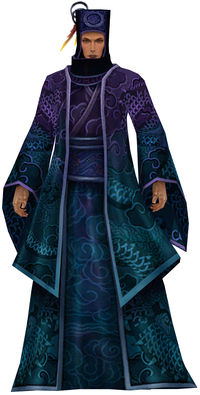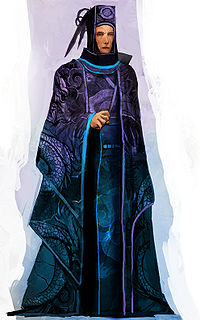Emperor Kisu
| Emperor Kisu | |
|---|---|

| |
| Affiliation | Imperial Guard |
| Type | Human |
| Professions | |
| Level(s) | 20 |
| Campaign | Factions |
| Image(s) | |
 Concept art by Kekai Kotaki. | |
“Born in: Kaineng City
Nation: Cantha
Profession: Ritualist
Age: 50
Emperor Kisu grew up admiring his elder half-brother Togo in Kaineng City. Both were sons of the last emperor, Kintah, but Kisu was the legitimate son of Kintah and his wife, while Togo—though 15 years Kisu’s senior—was born to the emperor’s favored concubine Yuki. The two were always close, but when Kisu left to take on the duties of empire, Togo followed a different path. Kisu became the sovereign ruler of several hundred thousand souls on the southern continent, while Togo studied the ways of magic and ritual. The emperor is respected and beloved by the Canthan people, even though few have ever actually seen him in person outside of the urban areas of Kaineng City.When not holding court, Emperor Kisu often dwells in his own palatial, private section of the city, Raisu Palace, which is forbidden to all but the emperor and those he chooses to allow inside. And every year during the Harvest Festival, he travels (with a well-armed entourage) to the temple where Shiro Tagachi slew Kisu’s ancestor 200 years earlier, in defiance of fear or fate.
Emperor Kisu (born either 1021 or 1022 AE) is the 31st Canthan Emperor, and the half-brother of Master Togo.
Locations[edit]
- Factions
- Shing Jea Island
- Shing Jea Monastery (only during the Dragon Festival finale)
- Kaineng City
- Divine Path
- Imperial Sanctum (outpost)
- Raisu Pavilion (only during City Under Attack)
- Tahnnakai Temple (explorable area) (only during A Meeting With the Emperor)
- Shing Jea Island
Quests[edit]
Quests involved in:
- Kaineng City
Skills[edit]
 Ether Feast (in Divine Path)
Ether Feast (in Divine Path)
Dialogue[edit]
- During A Meeting With the Emperor and City Under Attack
- "The Canthan Empire has seen dark times before, but I fear Shiro brings a darkness no light can penetrate."
- Raisu Palace
- "Emperor Kisu is bound by Shiro and cannot speak."
- Imperial Sanctum (outpost)
- "Togo was selfless with his life. Shiro harnessed Togo's honor and used him to complete the ritual. His loss is a huge blow to all of Tyria, but we must not let grief stop us now. Failure here means that all of Cantha is lost. Go now and defeat Shiro once and for all."
- "What do you need?"
- ⇒ Recap Shiro's misdeeds for me.
- "Togo has been slain! The spilling of his blood completed Shiro's ritual, and he is now mortal. I am safe thanks to you, but my half brother is lost."
- ⇒ Let's talk about something else.
- ⇒ What is happening in the Imperial Sanctum?
- "Now that Shiro is mortal, you must defeat him before he is able to wreak havoc upon all of Cantha. Kuunavang will provide some assistance, and Mhenlo shall join you to avenge Togo's death. I am powerless against Shiro, so you must fight without my help."
- ⇒ Let's talk about something else.
- ⇒ Give me advice I can use to defeat Shiro.
- "1. Kuunavang will teach you a skill if you wish."
- "2. Attack Shiro with everything you have, but beware that he will try to banish you."
- "3. If you are banished, kill every monster on the island and you will rejoin your party with your new skill and Resurrection Signet recharged."
- "4. If you fall while banished, Shiro will teleport your body back to the fight so that you can witness his dominance from the afterlife."
- ⇒ Let's talk about something else.
- ⇒ Replay the mission cinematic.
- × I'll be on my way.
- Divine Path
- "I will build a monument to my brother. He was a great man and any tribute to him must be fitting. Until that day, I pray that you keep him in your memories."
- Shing Jea Monastery (during the Dragon Festival finale)
- "The Dragon Empire burns as a guiding light for the rest of the world to follow."
Trivia[edit]
- Kisu is voiced by Fred Tatasciore.
- Kisu may be derived from a Japanese name (kanji: 木須, hiragana: きす). 木 means 'tree, wood' and 須 means 'short moment' which is suggested to be a causative derivation of Old Chinese 懦 meaning 'weak, soft', suggesting that Kisu may mean 'soft wood'.
- In the Divine Path, at the end of all the dialogues, he will start dancing. He uses the male Warrior dance.
- Kisu's reign has lasted 69 years (1058–1127 AE). He is one of three emperors of whom we know the length of tenure.